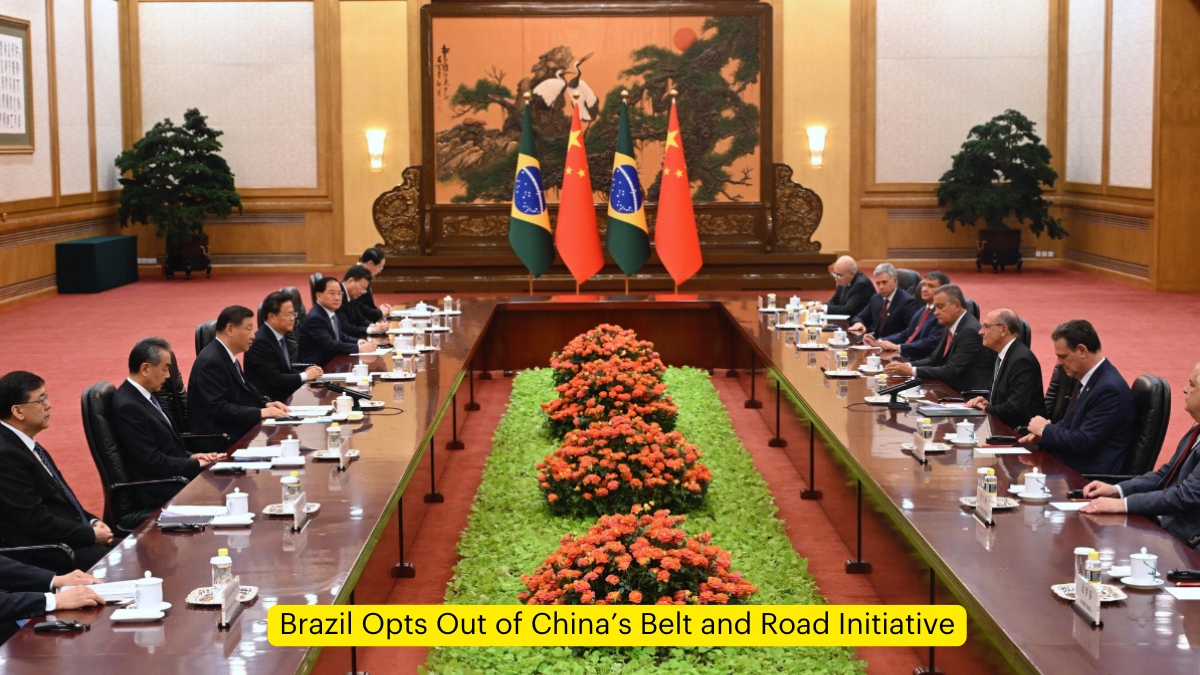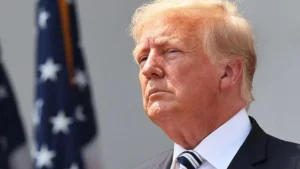In a significant diplomatic decision, Brazil has chosen not to join China’s Belt and Road Initiative (BRI), becoming the second member of the BRICS bloc, after India, to opt out of Beijing’s ambitious multi-billion-dollar infrastructure project. The move has sparked widespread interest and debate, as it reflects Brazil’s cautious stance on joining China’s influential global initiative. The decision, led by President Luiz Inácio Lula da Silva and influenced by Celso Amorim, his special presidential adviser for international affairs, signals Brazil’s intent to pursue alternative forms of collaboration with China, without becoming bound by the BRI’s framework.
Brazil’s Decision to Opt-Out of BRI: A Strategic Shift in Foreign Policy
According to Celso Amorim, Brazil aims to “take the relationship with China to a new level” without signing an accession agreement for the BRI. In an interview with the Brazilian newspaper O Globo, Amorim emphasized that Brazil does not see the necessity of formal BRI membership to establish stronger economic ties with China.
Instead, Brazil envisions an approach that selectively incorporates elements of the Belt and Road framework to align with its own infrastructure projects. The goal, Amorim suggested, is to explore “synergy” between Brazilian infrastructure projects and investment funds linked to the BRI, without fully endorsing or joining the initiative. This nuanced approach reflects Brazil’s intent to preserve its autonomy while engaging with Chinese investments on its own terms.
The Background and Motivation Behind Brazil’s Decision
The decision comes just weeks before Chinese President Xi Jinping’s planned visit to Brasilia on November 20, where it was anticipated that Brazil’s joining of the BRI would be a key agenda item. For Beijing, Brazil’s membership would have marked a major diplomatic win, strengthening the BRI’s legitimacy and showcasing its appeal within the BRICS framework. However, Brazil’s economic and foreign affairs ministries reportedly voiced opposition to joining the initiative, citing concerns about its benefits and potential political implications.
Concerns Over Economic Viability and Geopolitical Implications
Brazil’s skepticism towards the BRI is rooted in both economic and geopolitical concerns. Officials expressed doubt that joining the BRI would yield substantial benefits for Brazil, especially in the short term. Additionally, there were concerns about Brazil’s relationship with the United States, particularly with a possible Trump administration in the near future.
The U.S. Trade Representative Katherine Tai has also advised Brazil to approach the BRI proposal with caution, emphasizing the importance of “risk management” when considering joining China’s infrastructure project. She urged Brazil to analyze the BRI with an “objective lens,” a statement that drew criticism from the Chinese Embassy in Brasilia, which labeled her remarks as “irresponsible” and “disrespectful.” China’s state-run Global Times responded by characterizing Tai’s comments as part of the “Monroe Doctrine”, underscoring Beijing’s frustration with perceived U.S. interference.
India’s Long-standing Opposition to BRI: An Influence on Brazil?
Brazil’s decision to stay out of the BRI aligns it with India’s long-standing opposition to the initiative, underscoring a shared skepticism within the BRICS bloc. India has remained steadfast in its refusal to endorse the BRI, citing sovereignty issues and lack of transparency in its projects. India’s opposition is especially vocal regarding the China-Pakistan Economic Corridor (CPEC), a $60 billion flagship BRI project that runs through Pakistan-occupied Kashmir (PoK), an area claimed by India.
India’s primary criticisms of the BRI include:
- Violation of Sovereignty: India sees the construction of CPEC through Pakistan-occupied Kashmir as a direct infringement on its sovereignty.
- Financial Sustainability: India has highlighted that BRI projects often lead to debt traps for smaller countries, creating financial instability and long-term economic challenges.
- Transparency and Governance: India has consistently argued that BRI projects lack transparency, do not adhere to international norms, and often undermine good governance.
This sentiment is shared by other countries and regions where BRI projects have been linked to issues of debt dependency. A notable example is Sri Lanka’s Hambantota Port, which China took over on a 99-year lease after Sri Lanka struggled to repay its loans. This “debt-trap diplomacy” has led to significant scrutiny of the BRI in the international community, which may have further influenced Brazil’s decision to approach China’s proposals with caution.
Brazil’s Vision: A Collaborative Relationship with China Beyond BRI
Despite Brazil’s decision not to formally join the BRI, its leaders have reiterated the importance of strengthening economic ties with China. According to Amorim, Brazil remains open to collaboration with Chinese investors on specific projects but prefers to maintain flexibility and independence in its dealings.
The focus will be on exploring investment opportunities that align with Brazil’s national priorities, particularly in infrastructure. Amorim has emphasized that while China can call its initiative “the belt [and road],” what truly matters for Brazil is that projects are beneficial and sustainable. Brazil intends to present priority projects to China that may or may not align with the BRI’s objectives, allowing Brazil to control the terms of engagement.
A Setback for China’s Belt and Road Initiative
Brazil’s decision not to join the BRI represents a significant setback for China, particularly as Beijing had hoped to use Brazil’s participation to bolster its influence within Latin America and strengthen ties within BRICS. This decision also reflects a broader trend of countries reevaluating the benefits and risks associated with the BRI, especially amid concerns about sovereignty, debt dependency, and geopolitical alliances.
With Brazil and India opting out, the BRICS bloc is divided on its stance towards the BRI, signaling that not all member countries are willing to adopt China’s flagship initiative. This division could have long-term implications for China’s ability to use BRICS as a platform to further its geopolitical agenda.
Reactions from the International Community
The decision has sparked varied responses from the international community. The United States has welcomed Brazil’s cautious approach, viewing it as a positive step towards maintaining sovereign decision-making and avoiding potential economic entanglements. Meanwhile, China’s reaction has been one of disappointment, as indicated by the critical editorials in Chinese state media outlets.
China’s Global Times editorial went as far as to suggest that U.S. comments on the matter were part of a “Monroe Doctrine” mindset, implying that the U.S. was attempting to influence Brazil’s decision-making process as part of its broader strategy to counterbalance Chinese influence in Latin America.
Future of Brazil-China Relations: Towards Strategic Partnership Without BRI
Brazil’s decision not to join the BRI does not imply a cooling of relations with China. Instead, it reflects Brazil’s intent to pursue a strategic partnership with Beijing on its own terms. With Dilma Rousseff heading the Shanghai-based BRICS New Development Bank (NDB), Brazil remains committed to BRICS and continues to value its partnership with China.
In choosing not to formally endorse the BRI, Brazil is aiming to craft a relationship that promotes mutual benefits while safeguarding its economic and political interests. This stance allows Brazil to remain a key player in BRICS without being directly involved in China’s strategic ambitions.




 Trump Slaps 10% Global Tariff on All Imp...
Trump Slaps 10% Global Tariff on All Imp...
 U.S. Department of State Launches $200 M...
U.S. Department of State Launches $200 M...
 India Joins 100+ Nations in Strong Stand...
India Joins 100+ Nations in Strong Stand...








